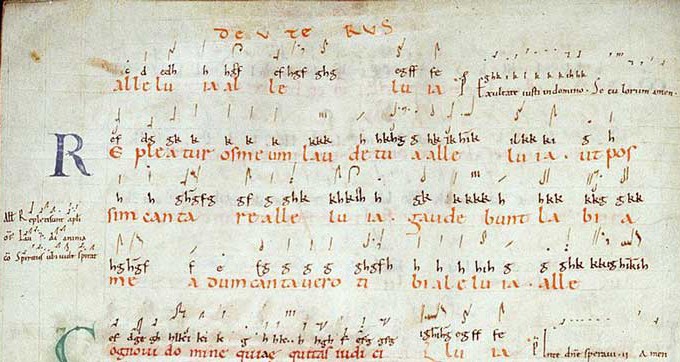
Christians have worshipped primarily through the medium of song since Christian Antiquity, creating thereby spiritually and artistically rich traditions of liturgical singing that are comparable to iconography in their spiritual and artistic stature. It must be admitted, however, that the musical aspect of Orthodox and early Catholic traditions are poorly known and even less understood.
The technical, historical, and cultural reasons for this situation include: the specialized scholarly skills required for the study of music (especially when written in Byzantine or early forms of notation); the need for a more developed educational infrastructure; and the absence in many places of the close connections between Christian liturgical singing and folk or popular song found in, for example, Russia, the Balkans and Southern Italy, or the Middle East. [pullquote_right] Yet even more important is a basic fact: the riches of traditional Orthodox and Catholic music (as “black and red dots on a page”) remain inaccessible for contemplation, devotion and study until they are sung and heard, ideally live but also through the medium of recordings. [/pullquote_right]
In 1991 Alexander Lingas, today one of the world’s leading authorities on liturgical music drawn from the wider “Roman” oikoumene of the Christian East and West, founded the professional vocal ensemble Cappella Romana in the Pacific Northwest to help fill this void at the highest possible musical and scholarly levels. Already from its origins as a group of friends singing for local audiences in the Pacific Northwest, Cappella Romana addressed the full historical range of the Christian musical inheritance: from ancient chants by medieval saints to world premieres by contemporary Orthodox and Catholic composers. The wider significance of the ensemble’s work was recognized as early as its second season, when its performances of Estonian Orthodox composer Arvo Pärt’s St. John Passion and Russian Baroque liturgical music were broadcast throughout the USA on National Public Radio.
Today Cappella Romana pursues activities ranging in scope from the local to the international. At one end of the spectrum, it has supported educational initiatives at the level of the parish (teaching Byzantine chant to children at Agia Sophia Academy in Portland) and the diocese (funding travel for a faculty meeting of the San Francisco Metropolis’s Church Music Institute) while continuing to produce a multi-program season of early and contemporary music for its loyal audiences in Portland, OR and Seattle, WA. Of national and international significance is its ambitious program of musical scholarship, touring and recording, which has attracted the attention of leading media such as the Los Angeles Times, the Wall Street Journal, the Washington Post, Gramophone, Early Music America and Odyssey, as well as national broadcasts in the USA, the United Kingdom (BBC Radio 3), Ireland and Greece.
Cappella Romana undertakes cutting-edge scholarship that is carried out in a pan-Orthodox and collaborative manner with experts from around the world. Authorities on Orthodox and Western sacred music whose expertise as scholars, conductors, or performers have been active participants in live concerts, recordings, or publication projects include Ioannis Arvanitis (Univ. of Copenhagen), Marcel Pérès (Ensemble Organum, Moissac, France), Mark Bailey (Yale University), Prof. Achilleas Chaldaiakis (Univ. of Athens), Archimandrite Ephrem Lash (Archdiocese of Thyateira and Great Britain), Rev. Dr. Ivan Moody (Portugal) and Dr. Vladimir Morosan (Musica Russica).

You must be logged in to post a comment.